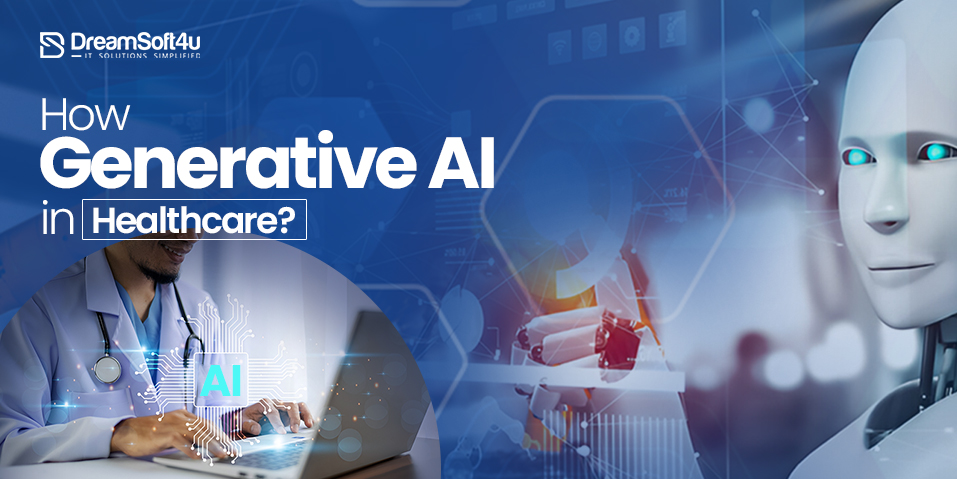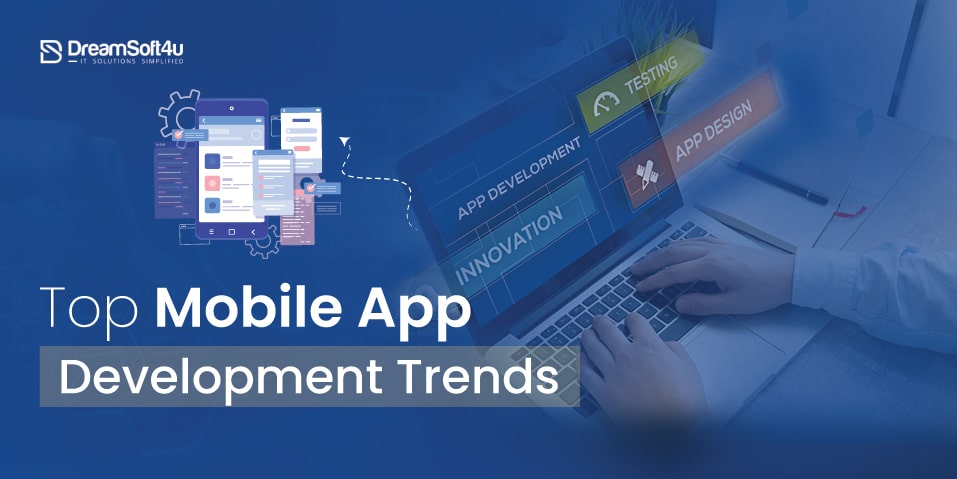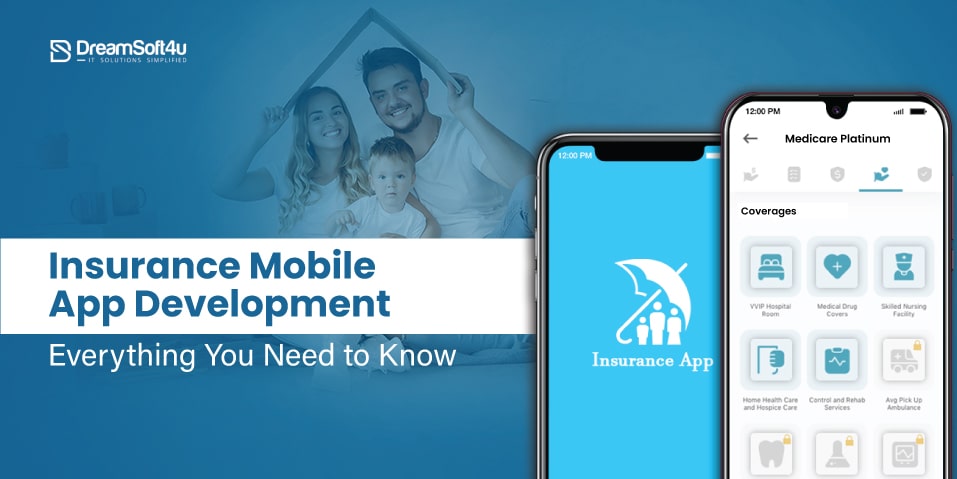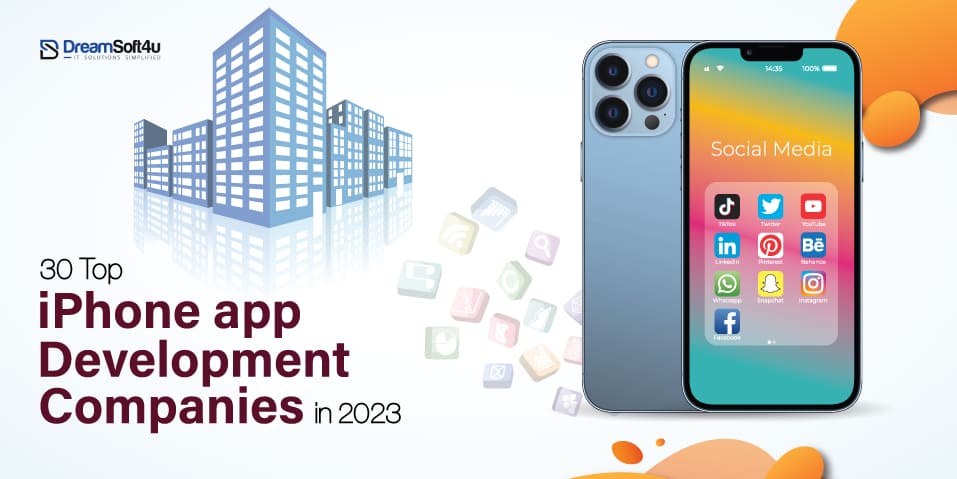In the modern world, healthcare applications are gaining immense popularity as they revolutionize the healthcare industry. To ensure the success of these applications, having the right healthcare app developer onboard is vital. To hire healthcare app developers who understand the complexities of building an application is hectic. Fret not, as we have got you covered. This article will walk you through the healthcare app developer hiring process. No matter if you are a healthcare expert or a business wanting to enter the healthcare industry, this guide will help you make the right decisions. So, without any delay, here we go!
Table of Contents
ToggleWhat are healthcare applications?
A healthcare application is a mobile app which offers different healthcare app development services. These include checking patient medical records and scheduling appointments. Such an application is designed for both healthcare experts and patients, allowing patients to get quality healthcare services remotely from the comfort of their homes.
By integrating with wearable devices, these applications keep track of a user’s health metrics. The primary aim of healthcare applications is to improve patient’s health status and streamline healthcare delivery. Some common examples of healthcare apps are billing, telehealth, practice management, and medical coding apps. These applications help patients and doctors to work together and diagnose patients.
A report says the global digital health market is expected to witness a growth from USD 240.9 billion in 2023 to USD 946 billion in 2030.

Key features of healthcare applications
Some key features of healthcare applications are:
1. Virtual consultation
healthcare apps come with telemedicine features that allow healthcare experts to deliver quality health facilities to patients remotely via video calls, or phone. This is ideal for people wanting regular checkups or those established in remote locations. Virtual consultation promotes prescription management and timely medical advice. This reduces the need for in-person visits, saving time and resources.
2. Electronic health record access
Another popular feature found in healthcare apps is EHR access. This feature ensures that lab results, medical history, and imaging studies are easily accessible. It improves continuity of care and promotes accurate diagnosis.
3. Appointment scheduling and reminders
Using these applications, patients must be able to schedule appointments and cancel them directly from their devices. Additionally, it is possible to send automated notifications and reminders about upcoming appointments. It reduces the chances of no-showups.
4. Medication management
Patients can maintain excellent track of their prescriptions and refill dates using medication management features. Besides receiving notifications for possible drug interactions, reminders are set up to take their pills and access pharmaceutical information. This function is essential for enhancing medication compliance and guaranteeing that patients successfully carry out their recommended treatment regimens.
5. Health monitoring and fitness tracking
Healthcare apps, when integrated with wearable technology and sensors, can keep an eye on vital indications such as blood pressure and heart rate. They monitor dietary consumption and sleep habits. They also keep track of physical activity. These features enable consumers to keep a healthy lifestyle, detect possible problems early, and manage their health proactively.
Who are healthcare app developers?
Healthcare app developers are experienced professionals or fully-fledged companies who design and develop software apps for the healthcare industry. These include UX/UI designers, software engineers, medical consultants, and healthcare IT experts. When you hire a dedicated developer, you get expertise in designing and building apps tailored to diverse needs, including patient management, telemedicine, fitness tracking, and electronic health record systems. Healthcare app developers collaborate with researchers and doctors to ensure the app meets all security and clinical standards, ensuring the data remains protected.
Reasons to Hire Healthcare App Developers
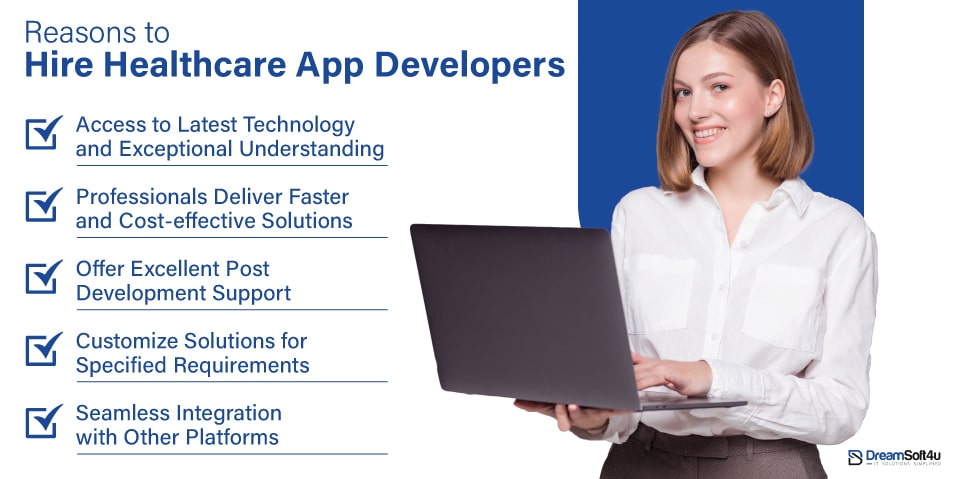
Here are some common reasons to hire healthcare app developers:
1. Access to latest technology and exceptional understanding
Developing a healthcare app is a tedious process. Therefore, you need an experienced professional who understands all the latest technologies and possesses deep knowledge of the development process. To ensure a successful outcome, hire healthcare app developers well-versed with regulations like HIPAA (Health Insurance Portability and Accountability Act) and GDPR (General Data Protection Regulation).
2. Professionals deliver faster and cost-effective solutions
Unlike the common belief, hiring a healthcare app developer reduces costs. On-Demand App Development is a long and costly procedure. If you try to build an app by yourself, it may lead to a complete disaster. On the other hand, healthcare app developers charge based on their expertise and requirements. With the help of these professionals, you can have a feature-rich app without making a hole in your pockets.
3. Offer excellent post-development support
Once the application building and launching process is complete, the developer’s work does not end here! A healthcare app developer puts in extra effort and provides post-development support. They mitigate all potential risk factors and deliver top-notch maintenance services.
4. Customize solutions for specified requirements
Frequently, healthcare organizations and providers have particular needs not satisfied by generic apps. Healthcare app developers can design unique solutions suited to particular patient demographics, clinical procedures, and workflows. This personalization increases the app’s efficacy and streamlining processes. To satisfy specific requirements, developers can incorporate functions like appointment scheduling, EHR access, and telemedicine.
5. Seamless integration with other platforms
Skilled developers of healthcare apps can guarantee a smooth connection with current healthcare systems, including:
- Hospital administration systems
- Laboratory information systems
- Electronic health records
Maintaining continuity of care and reducing the administrative burden on medical staff are all made possible by interoperability.
Steps to Hire Healthcare App Developers
Here is the step-by-step process of hire healthcare app developers:

1. State your requirements clearly
First and foremost, state your project objectives and requirements. You must outline a complete list of features required in the application. These include:
- Telemedicine capabilities
- EHR integration
- Health monitoring tools
Additionally, consider your targeted audience and different integrations with the existing system. An in-depth understanding of the project helps determine the necessary skills essential for potential developers.
2. Research and shortlist developers
Investigate thoroughly to find possible prospects. Seek out developers or businesses with a proven track record of creating healthcare apps. Examine their case studies, portfolios, and customer endorsements to determine their level of experience and knowledge. Make a shortlist of applicants who have successfully finished related tasks and received favourable client feedback.
3. Evaluate technical skills and expertise
Assess the technical understanding and expertise of all shortlisted developers. It is essential to conduct technical interviews and coding tests. You must ask for samples to check previous work. Thus, focus on their understanding of different programming languages and frameworks. Additionally, determine their problem-solving abilities.
4. Check past work and references
To learn more about the developers’ work ethics, dependability, and deadline-meeting skills, ask for and follow up on references from prior clients. Examine their prior work to determine how successfully they executed and whether they produced high-calibre, user-friendly applications that satisfied the needs of the clients. This is essential in confirming their claims and ensuring their work meets your standards.
5. Access communication skills and cultural fit
For successful collaboration, effective communication is needed, and an excellent cultural fit is needed. During the interview, you must evaluate the developer’s communication skills. Discuss the team dynamics and working style to ensure it aligns properly with the organizational culture.
Common mistakes you must avoid when hiring healthcare app developers
Here are some common to avoid while hiring developers:
1. Failing to verify industry experience
not ensuring that developers have experience in the healthcare sector is one of the biggest errors. Healthcare apps must meet specific needs like data security and regulatory compliance. Without any prior healthcare experience, developers might find it difficult to achieve these requirements. Candidates with a track record of developing healthcare apps should always be given preference.
2. Overlooking regulatory compliance
To preserve patient data and guarantee privacy, healthcare apps have to abide by strict rules. Serious legal problems and data breaches may result from failing to confirm that the developers are aware of and capable of implementing these requirements. Verify that the developers working on your project have expertise in creating compliance solutions and are aware of the pertinent legislation.
3. Choosing cost over quality
Budgetary restrictions do exist. However, choosing the least expensive developers frequently leads to products that are of poor quality. Cheap developers may take shortcuts, which could result in a lack of essential features, poor performance, and security flaws. Instead, pay attention to the developers’ portfolio, output standards, and client endorsements. Putting money into high-quality development upfront will help you avoid subsequent expensive repairs and reputational harm.
4. Improper testing and quality assurance
Sure developers do not give special attention to testing and quality assurance for the application. In the healthcare industry, thorough testing and quality assurance are vital as these applications contain sensitive information like patients’ medical data. Thus, choose a developer who conducts an in-depth QA process and thorough testing. Skipping quality checks may lead to risk factors.
5. Poor communication and lack of transparency
Clear and concise communication is the key to successful custom healthcare software development services. Hiring developers who do not follow a transparent communication channel or do not keep you in the loop during the development process may result in misunderstandings. Thus, you must establish your communication expectations in the beginning. This ensures everyone is on the same page!
Must-have skills in a healthcare app developer
Here is a complete list of essential skills required to become a healthcare app developer:
1. Interoperability In Healthcare
a. Integration standards
Integration standards are acknowledged as the industry’s glue. Furthermore, because HL7-FHIR is widely used, Health Level-7 2. has the most widely accepted interoperability standards. On the other hand, NCPDP SCRIPT, ANSI X12n 5010 DICOM, and HL7 v3 CDA are among the other standards that healthcare software developers might need to be familiar with.
b. Semantic vocabularies
In the previous skill, syntactic standards were covered. Semantic vocabularies complement these standards. Moreover, these languages must be used to interpret these clinical data.
c. Frameworks for integration
Integration frameworks force current interoperability standards to conform. Besides offering semantic and syntactic interchange, they encompass the entire clinical process.
Popular frameworks include IHE and HITSP. Developers of healthcare apps should also become familiar with the standards that the leading EHR manufacturers utilize. Being able to comprehend and collaborate with these suppliers will be beneficial.
2. Technical skills
Here are some technical skills that a developer must have:
a. Big data AI
With the rise of the health management population, it is critical to concentrate on analyzing both structured and unstructured healthcare data.
b. Data security
The most important thing in the healthcare sector is data protection. Consequently, developers of mobile apps for healthcare should be well-versed in libraries, coding conventions, and encryption technologies.
c. Third-party integration
Large EHR vendors and other healthcare companies are realizing they can offer solutions for every step of the care delivery process. Electronic health record vendors are increasingly urging specialized companies to join their platforms and collaborate with them.
3. Conceptual Frameworks
a. HIPAA, the Health Insurance Portability and Accountability Act
Developers of healthcare apps should thoroughly understand the HIPAA compliance and regulation checklist. It also aids developers in putting security measures into practice that comply with the legal framework.
b. FDA, or Food and Drug Administration
The FDA is looking to improve relevance in the fundamental healthcare delivery process. It’s not as well-known as HIPAA. Furthermore, MHealth software developers must understand when their applications are subject to FDA regulations.
FDA approvals adhere to a particular procedure that considers the agency’s complexity. This procedure aims to guarantee that healthcare technology and products are safe and comply with regulations.
c. Revenue Cycle Processes
Solutions for developing healthcare apps should have a solid grasp of the revenue cycle workflow. Furthermore, they must be well-versed with denial procedures, billing schedules, and payment structures. Additionally, the speciality of healthcare software developers affects this proficiency.
4. Soft skills
a. Planning and Coordination
The healthcare industry is focused on interoperability, as was previously discussed. Moreover, it involves several moving components and cooperation with several parties.
Therefore, in order to identify dependencies and work with other stakeholders, a healthcare mobile app developer needs to possess these essential abilities.
b. Interpersonal
Having the appropriate interpersonal skills is essential for healthcare software developers to provide efficient planning and collaboration.
Additionally, these abilities facilitate polite verbal communication and teamwork among crew members, guaranteeing successful outcomes in the process of growth.
c. Usability
Although the usability feature of the development process is handled by developers, however, your healthcare developer must possess this valuable skill as it promises a user-friendly experience.
Tips to hire healthcare app developers
Here are common tips for hire healthcare app developers:
- Choose a developer with relevant experience in developing healthcare applications.
- Before hiring a developer, examine their past work as it indicates the candidate’s ability to work.
- Make sure the potential developer has both hard and soft skills. They must have a detailed understanding of various programming languages and frameworks.
- Since handling healthcare and medical data is sensitive, the developer must understand security standards properly.
- Choose a healthcare app developer with excellent communication and collaboration skills.
- Ask for client references beforehand.
Looking For Industry-Level Healthcare App Developers?
DreamSoft4U has team of professionals to delivered a tailored app solution
Things to consider
Here are some things to consider:
1. Experience
Choose a developer who has experience in developing applications in the healthcare industry. This understanding is vital to understanding compliance needs and developing applications.
2. Technical understanding
Look for a developer who is well-versed with all the latest technologies and platforms, such as Android and iOS. They should have an understanding of different programming languages like Java, Kotlin, and others.
3. Portfolio and references
Before hiring Android app developers, you must go through their portfolio to check the quality of their work. Ask them to show their portfolio. Additionally, you may contact different references to understand their communication skills and overall work.
4. Understanding of compliance and security standards
The developer should have a deep understanding of security standards and healthcare regulations. They must implement secure data storage and strong encryption to safeguard patient’s sensitive data.
5. Post-launch maintenance
Once the development process is done, the developer must provide after-launch services. Choose a developer who offers complete maintenance.
How can DreamSoft4u help in healthcare app development?
Dreamsoft4U is a US-based software development company that delivers top-notch AI in healthcare solutions to clients globally. We have a team of highly specialized and experienced experts who design high-quality solutions that add value to your business. Contact us today!
Conclusion
Businesses wanting to improve their business in the healthcare industry must invest in healthcare applications. Regarded as the “future of the healthcare industry,” these apps will ensure you remain ahead of the competition. Building an app yourself is a time-consuming and tedious process. Thus, you can hire healthcare app developers from Dreamsoft4U! We have a team of experts who deliver timely solutions. Get in touch with us now!
FAQs
1. How to build a healthcare application?
Here is the step-by-step process to build a healthcare application:
- Analyze a problem
- Identify the problem
- Pre-requisites
- Choose a location to launch the app
- Pay attention to UX and UI
- hire full stack developer
- Test and launch the app
2. What are the major advantages of hiring a healthcare app developer?
Major advantages are minimizing human error, better medical treatment, excellent medical equipment maintenance, and remote patient monitoring.
3. What problems are solved by mobile app developers?
Mobile app developers majorly solve issues like improved patient care, streamlining processes, ensuring compliance, and integrating emerging technologies.
4. List common types of healthcare apps
Some popular healthcare applications are:
- Clinical use or diagnosis apps
- Prescription reminder apps
- Medical referencing apps
5. List common pitfalls when hiring a developer
Some common pitfalls are not verifying credentials, choosing cost over skills, and not considering the product lifecycle.












